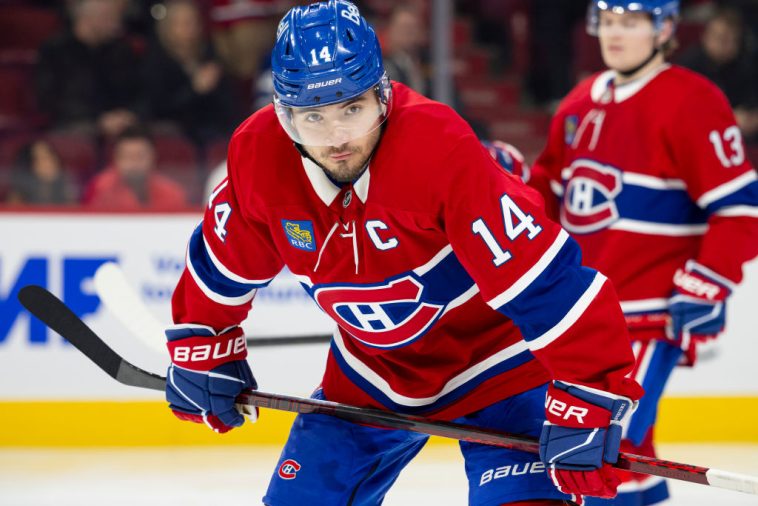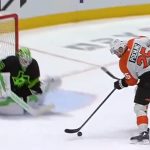A new level
Of confidence
And power
-Phil Anselmo, Pantera (Vulgar Display of Power, 1992)
Ahhhh the gentle poetry of Pantera: a new level of confidence and power!
All of this should be music to the ears of Habs fans these days.
Not sure if he’s a big fan of Pantera, but this new level of confidence and power is somewhat what Canadiens captain Nick Suzuki seems to have reached after knocking on the door of Kent Hughes to tell him not to make any trades at the deadline.
To tell him that his team was going to make the playoffs.
And all of this is enough, of course, to relaunch the great debate about Nick Suzuki’s place in the hierarchy of NHL centers.
What is a “true number one center”?
I often agree with Simon “Snake” Boisvert, both in his evaluations of prospects (except for Trevor Connelly!) and in his vision of building a hockey team and what it takes to build a winning team.
However, I’m a bit less in agreement with his definition of a “true number one center”, although I understand the principle.
According to the “Snake’s” definition, pivots of this nature are “capable of dominating the game night after night, presence after presence. We see them on the ice, their domination jumps out at us”.
Tonally, according to Boisvert, there would only be a handful of individuals of this kind in the entire NHL.
This would be these nine well-known individuals: Connor McDavid, Nathan MacKinnon, Leon Draisaitl, Jack Eichel, Auston Matthews, Jack Hughes, Sidney Crosby, Alexander Barkov, and Brayden Point.
Right behind this select group of “true number one centers”, we would find the “borderline” Mark Scheifele, Tim Stützle, and Sebastian Aho.
And finally, a little further away, we would have Robert Thomas, Nick Suzuki, and say, Mathew Barzal and Anze Kopitar.
It’s hard to find fault with this “top-16”. We certainly have there the 16 best centers in the entire NHL right now… with a little thought for Macklin Celebrini.
But, in my opinion, we have all “true number one centers” there!
A slightly more generous definition
Without falling into the somewhat simplistic mathematical logic that there are 32 teams, therefore 32 number one centers – who would want Sean Couturier, Matty Beniers, Steven Stamkos, or Elias Lindholm as their number one center? – it seems to me that the Snake’s definition is a bit too restrictive. His top-9 of “true number one centers” only targets the cream of the crop, the elite++.
For my part, in general, a “true number one center” is a player who would be the best center on most NHL teams and who, in theory, well-surrounded, would be good enough in their role to win the Stanley Cup.
Thus, if I’m willing to say that McDavid and MacKinnon form a third by themselves, and that, at a stretch, when healthy, Draisaitl, Eichel, Matthews, Hughes, Barkov, and Crosby form another, there’s not really a big distinction to be made between the others when considering all the factors mentioned.
Right now, Suzuki, among the best scorers in the NHL since the Olympic break, is easily playing like a top-10 center in the NHL. At 25 years old, he seems to have reached his prime.
Nick Suzuki
First Canadiens player with an 80-point season since Alex Kovalev in 2007-08#GoHabsGo pic.twitter.com/sq41z1lw3e
— Sportsnet Stats (@SNstats) April 4, 2025
And next year, maybe Marco Rossi, Macklin Celebrini, or who knows who will reach this level. Everything changes and evolves with the seasons. We’re not talking about precious minerals, some of which will forever be purer than others and can thus be clearly distinguished.
Players get older, others get injured, some experience minor slumps here and there, others improve, become more mature, become better leaders, etc.
It’s all dynamic, biological, and “organic” and takes place in different social microcosms from one team to another.
In short, it’s fluid, it’s changing, and it leaves room for debate.
Good enough to lead a team to the Cup… but not alone
For me, what’s most important in the end – whether they’re capable of “dominating the game night after night, presence after presence” or not – is that the number one center is good enough to win the Stanley Cup with a good team around them.
It’s not necessarily the “top-tiers” of this or that category who resist all storms and win Stanley Cups: it’s the well-built teams that bet on good material in the right places.
Because, yes, as good as they are, and although they’ve come close in the past, Connor McDavid and Leon Draisaitl, at 28 and 29 years old, have still not managed to win the Stanley Cup, and the main reason is that their bosses have not yet managed to provide them with a solid team around them.
We could say almost the same thing about Matthews in Toronto.
Yet, centers much less good and talented than them, like Patrice Bergeron, Anze Kopitar, Jonathan Toews, and Ryan O’Reilly, have managed to win the Cup because they were able to evolve in better-built teams AND because they were good enough to lead (from Latin, conducere, “to lead together”) the locomotive, albeit not alone.
Eichel and Barkov, as good as they are, have also managed to win the Cup by leading very complete teams, “built for the playoffs”.
MacKinnon won the big honors in 2022 with a superb team around him, but hasn’t come close since the loss of Kadri and Landeskog (long-term injury). We’ll see what he does this season with the additions of veterans Brock Nelson and Charlie Coyle and the likely return of his Swedish captain.
I quite like Colorado’s chances this year…
In short, we understand that winning the Cup solely thanks to a dominant center is a myth. Even two aren’t enough sometimes.
It takes a high-quality team with no major weaknesses to win it all.
Your number one center, like your number one goalie and your number one defenseman, must fit positively into this team and be just dominant enough at the right time to meet the challenge.
The 2021 Canadiens and the Canadiens of the future
Suzuki, at 21 years old, with his 16 points in 22 games (minus-6 differential), was almost good enough as a number one center in 2021 to win the big honors with a Canadiens team “built for the playoffs”, but very imperfect.
It was a very well-surrounded Brayden Point who managed to do so.
The very young Suzuki was not the ideal number one center and certainly not the player he is today.
Maybe Danault (1 goal, 3 assists in 22 games) wasn’t the ideal number two center either.
And what about Tyler Toffoli and a very green Cole Caufield as the best wingers?
And surely Weber – who never played again and was holding on with pins and duct tape at that point – wasn’t the number one defenseman of our dreams, even if he was well-supported by Petry, Chiarot, and Edmundson.
Finally, even a generational goalie like Price, also very banged up and at the end of his career, couldn’t fill all the gaps in the team in front of him.
In short, the 2021 Canadiens weren’t strong enough in two of the three key positions, in addition to lacking depth on offense.
But the picture has already changed significantly. In addition to a mature Suzuki, the selection of a power forward like Slafkovsky, the arrival of Hutson, and a more complete Caufield, Montreal already has fewer weaknesses in key positions. And in the years to come, with the arrival of Demidov, Reinbacher, Hage, and certainly one or two other quality players, the team will have one of the best cores in the NHL.
One day, perhaps not too far away, Captain Suzuki should therefore be a number one center good enough to lead this group to the Stanley Cup.
At least, in theory!





GIPHY App Key not set. Please check settings